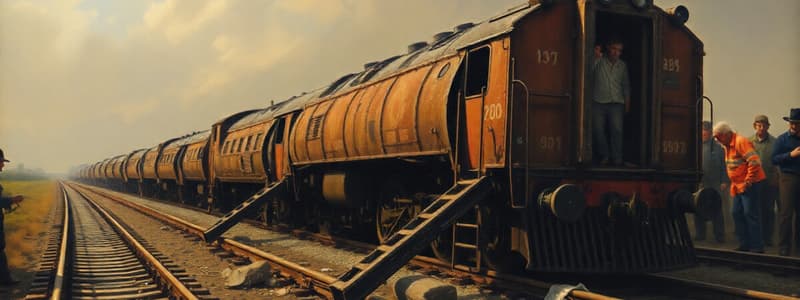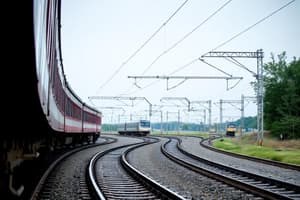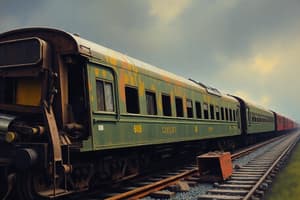Podcast
Questions and Answers
What aspect is assessed regarding the axle guard for IRS stock?
What aspect is assessed regarding the axle guard for IRS stock?
What is evaluated in the clearance between the spring and the spring gear?
What is evaluated in the clearance between the spring and the spring gear?
What condition is examined with the bogie in relation to the bolster?
What condition is examined with the bogie in relation to the bolster?
What measurement indicates the height of the buffer to be taken after uncoupling?
What measurement indicates the height of the buffer to be taken after uncoupling?
Signup and view all the answers
What defect condition is monitored in vehicles regarding load placement?
What defect condition is monitored in vehicles regarding load placement?
Signup and view all the answers
What should be indicated to describe the position of damaged components in an accident?
What should be indicated to describe the position of damaged components in an accident?
Signup and view all the answers
Which of the following is essential when detailing an accident within station limits?
Which of the following is essential when detailing an accident within station limits?
Signup and view all the answers
In a sketch of an accident site, which of the following should be clearly indicated?
In a sketch of an accident site, which of the following should be clearly indicated?
Signup and view all the answers
What must be included in the sketches to clarify the yard layout during an accident?
What must be included in the sketches to clarify the yard layout during an accident?
Signup and view all the answers
Which detail is crucial to fix the site of an accident precisely?
Which detail is crucial to fix the site of an accident precisely?
Signup and view all the answers
When sketching an accident site, what should the sketch represent?
When sketching an accident site, what should the sketch represent?
Signup and view all the answers
What additional information may be necessary to reconstruct the accident scene?
What additional information may be necessary to reconstruct the accident scene?
Signup and view all the answers
What is one characteristic that should be noted for the type of soil in the technical guide?
What is one characteristic that should be noted for the type of soil in the technical guide?
Signup and view all the answers
Which type of sleeper condition indicates that the sleeper is not suitable for use?
Which type of sleeper condition indicates that the sleeper is not suitable for use?
Signup and view all the answers
What should be assessed regarding rail joints according to the guidelines?
What should be assessed regarding rail joints according to the guidelines?
Signup and view all the answers
Which condition of rail is indicative of potential failure?
Which condition of rail is indicative of potential failure?
Signup and view all the answers
What is a potential location for a derailment according to the guide?
What is a potential location for a derailment according to the guide?
Signup and view all the answers
What role do rail fastenings, such as dog spikes, play according to the guidelines?
What role do rail fastenings, such as dog spikes, play according to the guidelines?
Signup and view all the answers
Which statement about the width of ballast is accurate?
Which statement about the width of ballast is accurate?
Signup and view all the answers
How should the condition of the ties be assessed?
How should the condition of the ties be assessed?
Signup and view all the answers
What is indicated by the term 'unserviceable' in the context of sleepers?
What is indicated by the term 'unserviceable' in the context of sleepers?
Signup and view all the answers
When is the proforma for derailment not required to be filled?
When is the proforma for derailment not required to be filled?
Signup and view all the answers
What is the preferred chord length for measuring versines on curves up to 10 degrees sharpness?
What is the preferred chord length for measuring versines on curves up to 10 degrees sharpness?
Signup and view all the answers
How often should versines be recorded when measuring them?
How often should versines be recorded when measuring them?
Signup and view all the answers
At what distance should additional data regarding vertical track profile be taken in relation to the point of derailment?
At what distance should additional data regarding vertical track profile be taken in relation to the point of derailment?
Signup and view all the answers
How should the levels for additional data be taken in relation to the track profile?
How should the levels for additional data be taken in relation to the track profile?
Signup and view all the answers
What measurement change indicates that additional vertical track profile data needs to be collected?
What measurement change indicates that additional vertical track profile data needs to be collected?
Signup and view all the answers
What should be done after the site of an accident has been cleared?
What should be done after the site of an accident has been cleared?
Signup and view all the answers
What should be done if a derailment occurs due to both terrain and mechanical failure?
What should be done if a derailment occurs due to both terrain and mechanical failure?
Signup and view all the answers
What is indicated if the measurement of versine is recorded against a cross level recording station?
What is indicated if the measurement of versine is recorded against a cross level recording station?
Signup and view all the answers
What is the significance of the date when recording payload in a derailment report?
What is the significance of the date when recording payload in a derailment report?
Signup and view all the answers
What is the criterion for excluding data in columns 2 to 19?
What is the criterion for excluding data in columns 2 to 19?
Signup and view all the answers
Which broken track materials should be included in column 19?
Which broken track materials should be included in column 19?
Signup and view all the answers
Under what condition should column 20 be filled in?
Under what condition should column 20 be filled in?
Signup and view all the answers
How should sag extents be recorded in columns 21 to 22?
How should sag extents be recorded in columns 21 to 22?
Signup and view all the answers
Which columns must be filled out for wooden sleepers during a derailment on curves?
Which columns must be filled out for wooden sleepers during a derailment on curves?
Signup and view all the answers
What should be the starting point for track measurements?
What should be the starting point for track measurements?
Signup and view all the answers
How should the cross level be measured?
How should the cross level be measured?
Signup and view all the answers
What is the recommended distance for measurements after marking the point of mount?
What is the recommended distance for measurements after marking the point of mount?
Signup and view all the answers
What is indicated by entries in columns 3, 4, and 5 regarding track measurements?
What is indicated by entries in columns 3, 4, and 5 regarding track measurements?
Signup and view all the answers
When should measurements be taken for individual sleepers?
When should measurements be taken for individual sleepers?
Signup and view all the answers
What specific detail must be clearly indicated in the sketches for a derailment report?
What specific detail must be clearly indicated in the sketches for a derailment report?
Signup and view all the answers
Which aspect of the derailment site sketch is crucial for covering the necessary area?
Which aspect of the derailment site sketch is crucial for covering the necessary area?
Signup and view all the answers
When sketching the site of an accident, which element is NOT required to be shown?
When sketching the site of an accident, which element is NOT required to be shown?
Signup and view all the answers
What should the sketch indicate regarding the rail joints?
What should the sketch indicate regarding the rail joints?
Signup and view all the answers
Which detail about the sketch must be labeled clearly to ensure accurate communication?
Which detail about the sketch must be labeled clearly to ensure accurate communication?
Signup and view all the answers
What must be done with the completed proforma after confirming the details at the accident site?
What must be done with the completed proforma after confirming the details at the accident site?
Signup and view all the answers
What specific feature should be included regarding the degree of curvature of the tracks?
What specific feature should be included regarding the degree of curvature of the tracks?
Signup and view all the answers
What is the primary purpose of measuring the clearance between the axle guard and the axle box?
What is the primary purpose of measuring the clearance between the axle guard and the axle box?
Signup and view all the answers
What condition is critical to assess regarding the spring and the spring gear during inspections?
What condition is critical to assess regarding the spring and the spring gear during inspections?
Signup and view all the answers
Which aspect should be specifically noted about the condition of the bolster during inspections?
Which aspect should be specifically noted about the condition of the bolster during inspections?
Signup and view all the answers
What is indicated by the measurement relating to the thickness of the brass in the axle box?
What is indicated by the measurement relating to the thickness of the brass in the axle box?
Signup and view all the answers
Which factor is critical concerning the condition of the shackle plate during evaluations?
Which factor is critical concerning the condition of the shackle plate during evaluations?
Signup and view all the answers
Which of the following types of ballast indicates it has not been properly managed?
Which of the following types of ballast indicates it has not been properly managed?
Signup and view all the answers
What condition of a sleeper would classify it as unserviceable?
What condition of a sleeper would classify it as unserviceable?
Signup and view all the answers
Which rail joint condition could most likely lead to potential derailments?
Which rail joint condition could most likely lead to potential derailments?
Signup and view all the answers
In what scenario would the position of the point of derailment most likely be indicated as on a falling grade?
In what scenario would the position of the point of derailment most likely be indicated as on a falling grade?
Signup and view all the answers
What does a loose fastening on rails primarily affect?
What does a loose fastening on rails primarily affect?
Signup and view all the answers
Which type of rail fastening would be critical to monitor for potential safety risks?
Which type of rail fastening would be critical to monitor for potential safety risks?
Signup and view all the answers
Which feature of the track's vertical profile is important when assessing derailment risks?
Which feature of the track's vertical profile is important when assessing derailment risks?
Signup and view all the answers
What is a common issue to look for regarding the density of wooden sleepers?
What is a common issue to look for regarding the density of wooden sleepers?
Signup and view all the answers
Which factor is essential to note about soil conditions when assessing track stability?
Which factor is essential to note about soil conditions when assessing track stability?
Signup and view all the answers
What implication does the presence of cracks or fractures in fish plates have?
What implication does the presence of cracks or fractures in fish plates have?
Signup and view all the answers
What should be indicated to show the extent of disturbance caused in the permanent way or train composition due to an accident?
What should be indicated to show the extent of disturbance caused in the permanent way or train composition due to an accident?
Signup and view all the answers
Which detail is necessary in a sketch to clarify the layout of a station during an accident?
Which detail is necessary in a sketch to clarify the layout of a station during an accident?
Signup and view all the answers
In the case of accidents near level crossings, what type of details should be furnished?
In the case of accidents near level crossings, what type of details should be furnished?
Signup and view all the answers
What must be clearly indicated in the sketch regarding track fittings after an accident?
What must be clearly indicated in the sketch regarding track fittings after an accident?
Signup and view all the answers
What is the purpose of using a single line to represent both rails in an accident sketch?
What is the purpose of using a single line to represent both rails in an accident sketch?
Signup and view all the answers
What additional information may be necessary in sketches apart from the basic layout?
What additional information may be necessary in sketches apart from the basic layout?
Signup and view all the answers
What type of details should be shown on the sketch related to damaged bridges involved in an accident?
What type of details should be shown on the sketch related to damaged bridges involved in an accident?
Signup and view all the answers
When reconstructing the scene of an accident, what should be included regarding broken parts of extraneous materials?
When reconstructing the scene of an accident, what should be included regarding broken parts of extraneous materials?
Signup and view all the answers
What is the significance of including more than one sketch in an accident report?
What is the significance of including more than one sketch in an accident report?
Signup and view all the answers
When recording versines for curves sharper than 10 degrees, what is the appropriate chord length to use?
When recording versines for curves sharper than 10 degrees, what is the appropriate chord length to use?
Signup and view all the answers
What interval should versines be recorded at when measuring?
What interval should versines be recorded at when measuring?
Signup and view all the answers
What additional data should be collected if the point of derailment is near a theoretical change of grade?
What additional data should be collected if the point of derailment is near a theoretical change of grade?
Signup and view all the answers
At what distance should levels for additional vertical track profile data be taken from the point of derailment?
At what distance should levels for additional vertical track profile data be taken from the point of derailment?
Signup and view all the answers
What condition is necessary to collect additional vertical track profile data?
What condition is necessary to collect additional vertical track profile data?
Signup and view all the answers
What should be the minimum distance covered for collecting additional vertical track profile levels?
What should be the minimum distance covered for collecting additional vertical track profile levels?
Signup and view all the answers
How soon should vertical track profile data be taken after the site of an accident has been cleared?
How soon should vertical track profile data be taken after the site of an accident has been cleared?
Signup and view all the answers
In what situation is it unnecessary to fill out the proforma following a derailment?
In what situation is it unnecessary to fill out the proforma following a derailment?
Signup and view all the answers
What measurement must be recorded at cross level recording stations related to versines?
What measurement must be recorded at cross level recording stations related to versines?
Signup and view all the answers
What is the appropriate stance if a derailment occurs due to both terrain and mechanical failure?
What is the appropriate stance if a derailment occurs due to both terrain and mechanical failure?
Signup and view all the answers
Study Notes
Proforma for Derailment Accidents
- The proforma is a document used in the event of a derailment
- Inspectors/officers of the relevant departments must complete it before leaving the accident site
- The completed form should be countersigned by the senior officer present at the accident site
- The proforma is part of the enquiry proceedings and should be sent along with them
Sketch of the Accident Site
- An engineering representative must create detailed sketches of the accident site
- The sketch should include dimensions, allowing a scale plan of the entire accident site to be created
- The sketch should accurately depict the railway track, including:
- Train number
- Date of the accident
- Kilometer marker of the accident site
- Accurate labeling is essential for proper documentation
- A technical guide on derailments should be followed.
- The sketch should show the direction of movement and the names of stations before and after the accident site.
- The sketch should cover a 300-meter length behind the point of the mount and an equal distance in front.
- Each track must be represented by a pair of lines.
- Level crossings, telegraph poles, bridges, tunnels, gradient posts, and gradient symbols should be included
- The beginning and end of curves, and details of curvature degree, super elevation, and transition length should be indicated.
- The positions of all derailed vehicles and the marks left by them on sleepers, rails, or ballast should be shown
- The mounting point with rail joint positions on either side should be indicated
- The drop point should be indicated
- The position of the derailed wheels of the first vehicle and any parts or components found should be depicted.
- Kilometers and center lines from the nearest point on the track must be marked.
Accident Location and Details
- Sufficient details about the station layout should be provided when the accident occurs within station limits
- The distance from the permanent structure to the accident site should be indicated
- The extent of the disturbance to the track (P. Way) and train composition due to the accident should be shown
- All track markers and sleeper or other track elements should be precisely located
- Broken parts and extraneous materials found at the accident site must be shown on the sketch with their precise locations relative to the track
- Multiple sketches may be necessary to clarify the yard layout and the system of working. One sketch should provide a yard layout. Another should show the positioning of wheels, etc.
Additional Details and Measurements
- Details about any structures or parts of the track should be included in the sketch
- Details of damage to bridges, if any, should be shown in the sketch
- Full details of level crossings involved in accidents must be furnished
- Any other details which would support reconstructing the accident scene should be included
- The left and right sides are relative to the direction of train movement
- Data in columns 2-19 need not be collected if the cause is obvious, like an obstruction.
- Data should be preserved related to broken materials if not obviously caused from the accident itself.
- Sags should be shown within 90 meters on either side
- For wooden sleepers, a statement clarifying the presence or absence of supporting plates is necessary
- The proforma need not be filled when the cause of derailment is obviously established due to major obstruction.
- Only broken track material which is not indisputably established to be broken after the accident should be included.
- All data in columns 2-19 should be omitted when defect obviously due to major track obstruction
Permanent Way and Soil Data
- Data on the condition of the soil (e.g., sandy, loamy clay, or black cotton) and the condition of the track (wet, slushy, etc.) should be collected
- The depth below sleepers and whether the ballast is cleaned or choked must be documented
- Width of shoulder of sleepers from each side should be included.
- Details about sleepers materials should be recorded.
- The type of soil (e.g., sandy, loam, clay) and its condition (firm, wet, slushy) should be noted
Rails and Their Condition
- The condition of wear and tear of the rail fastenings, such as dog spikes, keys, tie bars, etc., must be noted.
- The condition of each sleeper (tight/loose) must be documented.
- Details about rail joints, cracks, fractures of fish plates, fish bolts, and other components should be recorded.
Location of Points
- The location of the point of mount and the location of the derailment point should be marked relative to the existing straight track, curves, or transition areas.
- The condition of grade, level, or rises and sags, should be noted.
Tools for Measurements
- A list of necessary tools for measurements, including a gauge-cum-level, stepped feeler gauge set, fish-chord or nylon wire, steel scale, straight edge, and measuring tape, is provided.
- A good quality camera is also essential for photographic documentation.
- Additional tools for rolling stock measurements are also listed.
Studying That Suits You
Use AI to generate personalized quizzes and flashcards to suit your learning preferences.
Related Documents
Description
This quiz focuses on the procedures and documentation needed in the event of railway derailment accidents. It covers the use of proforma documents and the importance of accurate sketches of the accident site, ensuring all necessary details are captured for investigations. Understanding these steps is crucial for railway safety management.




